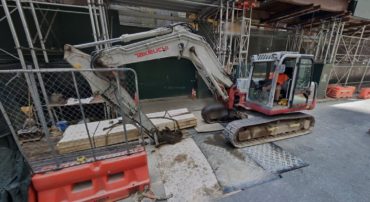
Steel plates outside of 159 West 48th Street. Image Credit: Google Maps.
OATH Appeals Board overturns Hearing Officer’s earlier determination. On October 14, 2020, in front of 159 West 48th Street in Manhattan, an officer from the Department of Environmental Protection (DEP) detected unreasonable noise from steel street plates permeating from Triumph’s Construction site, an indication that the steel plates were installed improperly. The officer measured the noise decibels emitting from the steel plates, confirmed it exceeded the mandated limit, and issued Triumph Construction a summons.
At a hearing held on February 3, 2021, Triumph Construction did not contest the noise decibel readings, but argued it had not received any notice of correction action from the Department of Transportation (DOT) that the street plate was installed improperly and therefore, was not on notice of any violating condition. Additionally, Triumph Construction argued that a steel street plate is not a “construction device” within the meaning of the noise code. Hearing Officer Tony Feldmesser agreed with Triumph Construction, found that DEP failed to prove the charge by a preponderance of the evidence, and dismissed the summons.
On appeal, The OATH Appeals Board reversed the hearing officer’s dismissal, finding that the hearing officer erred in concluding that a steel street plate is not a construction device as that term is defined in the noise code. The Board held that steel plates used to protect and cover street excavations are deemed construction devices that require a noise mitigation plan. In addition, the Board ruled that the lack of notice does not establish a defense, as DOT was under no obligation to advise Triumph Construction that the plates had been installed incorrectly. Triumph Construction is required to pay the civil penalty of $560.
DEP v. Triumph Construction, OATH Hearings Division Appeals Unit Appeal No. 2100638 (July 22, 2021)
By: Christopher Devivo (Christopher is a New York Law School graduate, Class of 2022.)

